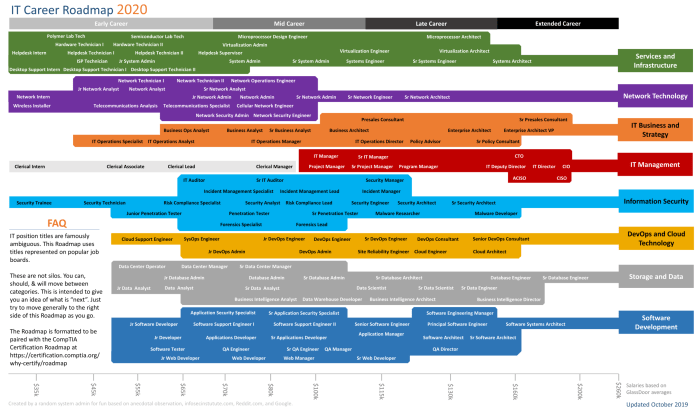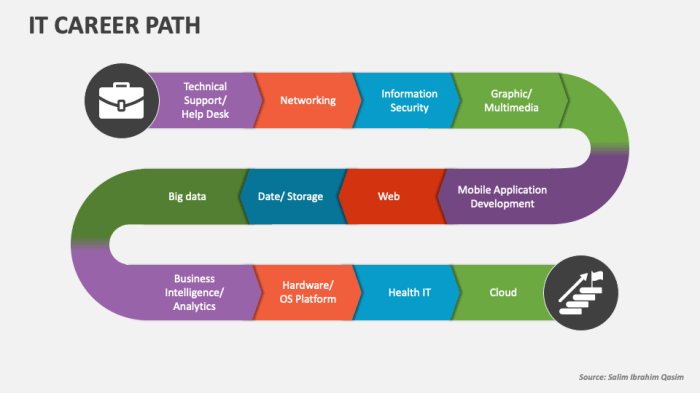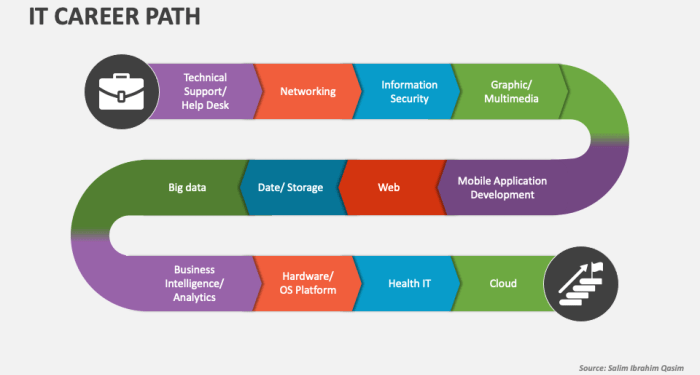Diving into the realm of Career paths in the IT industry, readers will embark on a journey filled with diverse opportunities and exciting possibilities. From cybersecurity to software development, this topic promises a wealth of information for those interested in pursuing a career in IT.
As we navigate through the intricacies of different roles and responsibilities, skills required for success, and examples of popular career paths, we will uncover the dynamic landscape of the IT industry.
Overview of IT Industry Career Paths
In the fast-paced and ever-evolving IT industry, there are numerous career paths that individuals can pursue based on their interests and skills. These career paths offer a wide range of opportunities for growth and development.
Various Career Paths in IT Industry
Within the IT industry, there are several popular career paths that professionals can choose from, each requiring specific skills and qualifications:
- 1. Cybersecurity: Professionals in cybersecurity focus on protecting computer systems, networks, and data from cyber threats and attacks. They are responsible for implementing security measures, monitoring for security breaches, and investigating incidents.
- 2. Software Development: Software developers design, develop, and test software applications or systems. They are involved in all stages of the software development lifecycle, from planning and coding to deployment and maintenance.
- 3. Data Science: Data scientists analyze and interpret complex data to help organizations make strategic decisions. They use statistical techniques, machine learning algorithms, and data visualization tools to extract insights from data.
- 4. IT Project Management: IT project managers oversee the planning, execution, and completion of IT projects. They are responsible for managing resources, timelines, and budgets to ensure successful project delivery.
Roles and Responsibilities
Depending on the chosen career path, professionals in the IT industry may have different roles and responsibilities. For example:
- Cybersecurity Analysts: Responsible for identifying and mitigating security risks.
- Software Engineers: Involved in designing and developing software solutions.
- Data Analysts: Analyze and interpret data to provide insights for decision-making.
- IT Project Managers: Coordinate and manage IT projects to achieve specific goals.
Skills and Qualifications
Success in the IT industry requires a combination of technical skills, soft skills, and relevant qualifications. Some common skills needed for different IT career paths include:
- Technical proficiency in programming languages, systems, and tools.
- Analytical and problem-solving skills to troubleshoot issues and find solutions.
- Communication and teamwork skills to collaborate with colleagues and stakeholders.
- Relevant certifications or degrees in IT, computer science, or related fields.
Entry-Level IT Positions

When starting a career in the IT industry, there are various entry-level positions available for individuals looking to kickstart their journey in this field. These positions provide a solid foundation for building a successful career in IT.
Common Entry-Level Positions in the IT Industry
- Help Desk Technician: Responsible for providing technical support to end-users and troubleshooting IT issues.
- Technical Support Specialist: Assists with software installations, troubleshooting hardware problems, and ensuring smooth IT operations.
- Junior Developer: Works under the guidance of senior developers to develop and maintain software applications.
- Network Administrator: Manages and maintains computer networks within an organization.
Typical Requirements for Entry-Level IT Jobs
- A degree in computer science, information technology, or related field is often required.
- Certifications such as CompTIA A+, Network+, or Microsoft Certified Professional (MCP) can be beneficial.
- Strong problem-solving skills, attention to detail, and the ability to work well in a team are essential.
- Relevant internships or hands-on experience can give you a competitive edge.
Tips for Landing Your First Job in IT
- Build a strong professional network by attending industry events and connecting with IT professionals.
- Showcase your skills through projects, internships, or freelance work.
- Customize your resume and cover letter to highlight your relevant experience and skills.
- Prepare for technical interviews by practicing coding challenges and familiarizing yourself with common IT concepts.
Growth Potential from Entry-Level Positions to Higher Roles
- With dedication, continuous learning, and gaining experience, entry-level IT professionals can advance to roles such as IT manager, systems architect, or cybersecurity specialist.
- Seeking additional certifications and pursuing higher education can open up opportunities for career progression within the IT industry.
- Networking with professionals in the field and staying updated on industry trends can help individuals climb the career ladder in IT.
Specializations within IT

As the IT industry continues to expand, professionals have the opportunity to specialize in various areas to meet the growing demand for specialized skills.
Network Administration
Network administrators are responsible for managing an organization's computer networks. They ensure network functionality, security, and performance. Skills required for this role include knowledge of network protocols, troubleshooting abilities, and attention to detail.
- Configuring and maintaining network hardware and software
- Implementing security measures to protect the network
- Monitoring network performance and optimizing for efficiency
Cloud Computing
Cloud computing specialists work with cloud infrastructure and services to help organizations store, manage, and process data. This role requires expertise in cloud platforms, virtualization, and data migration.
- Designing cloud architecture to meet business requirements
- Implementing cloud solutions and managing cloud resources
- Ensuring data security and compliance in the cloud environment
Artificial Intelligence (AI)
AI specialists focus on developing and implementing artificial intelligence solutions within organizations. They work on projects involving machine learning, natural language processing, and automation.
- Building AI models and algorithms to solve complex problems
- Training and testing AI systems for accuracy and performance
- Integrating AI technologies into existing systems for enhanced functionality
Demand for Specialized IT Professionals
With the increasing reliance on technology in various industries, the demand for specialized IT professionals continues to grow. Industries such as healthcare, finance, and e-commerce heavily rely on specialized IT roles to ensure smooth operations, data security, and innovation.
Conclusion
Specializing in a specific area within the IT industry can open up exciting career opportunities and allow professionals to contribute their expertise to diverse sectors that heavily depend on technology.
Advancement Opportunities in IT
In the dynamic field of Information Technology (IT), professionals have various opportunities for career advancement to climb the ranks and achieve greater success. Advancing in the IT industry requires a combination of skills, experience, and continuous learning to stay relevant in a rapidly evolving landscape.
Pathways for Advancement
- Specialization: IT professionals can advance by specializing in a specific area such as cybersecurity, cloud computing, data analytics, or software development. By becoming experts in a particular niche, they can command higher salaries and take on more challenging roles.
- Management Roles: Moving into management positions such as IT manager, project manager, or CTO can be a pathway for advancement. These roles require leadership skills, strategic thinking, and the ability to oversee teams and projects effectively.
- Advanced Certifications: Obtaining advanced certifications such as CISSP, PMP, AWS Certified Solutions Architect, or Cisco Certified Internetwork Expert (CCIE) can open up new opportunities for career advancement in IT.
Strategies for Advancement
- Continuous Learning: Staying updated with the latest technologies and trends in the industry is crucial for career advancement in IT. Professionals should pursue ongoing education, attend workshops, and participate in training programs to enhance their skills.
- Networking: Building a strong professional network within the IT industry can create opportunities for advancement. Networking events, conferences, and online forums can help professionals connect with industry experts and potential employers.
- Showcasing Achievements: Highlighting achievements, successful projects, and contributions to the organization can demonstrate value and competency, paving the way for advancement opportunities.
Successful Professionals in IT
- Sheryl Sandberg: Known for her role as COO of Facebook, Sheryl Sandberg started her career in IT as a management consultant and later became an executive at Google before joining Facebook.
- Satya Nadella: Satya Nadella, the CEO of Microsoft, began his career at Microsoft in 1992 and worked his way up through various roles to become the company's leader in 2014.
- Susan Wojcicki: Susan Wojcicki, the CEO of YouTube, started her career in IT at Intel and later became Google's first marketing manager, playing a key role in the company's growth.
Summary

In conclusion, Career paths in the IT industry offer a vast array of options for individuals looking to thrive in a fast-paced and ever-evolving field. Whether you're just starting out or aiming for career advancement, the IT industry holds endless possibilities for growth and success.
General Inquiries
What are some common entry-level positions in the IT industry?
Common entry-level positions in IT include help desk support, IT technician, and junior software developer.
What skills are needed for specialized roles like network administration or cloud computing?
Specialized roles in network administration or cloud computing require skills such as knowledge of networking protocols, security measures, and proficiency in cloud platforms.
How can professionals advance their careers in the IT industry?
Professionals can advance their careers in IT by pursuing certifications, gaining specialized skills, and taking on leadership roles within their organizations.






![What is IT Project Management? [2023] • Asana](https://business.mardinata.com/wp-content/uploads/2025/10/project-management-industries-120x86.jpg)




